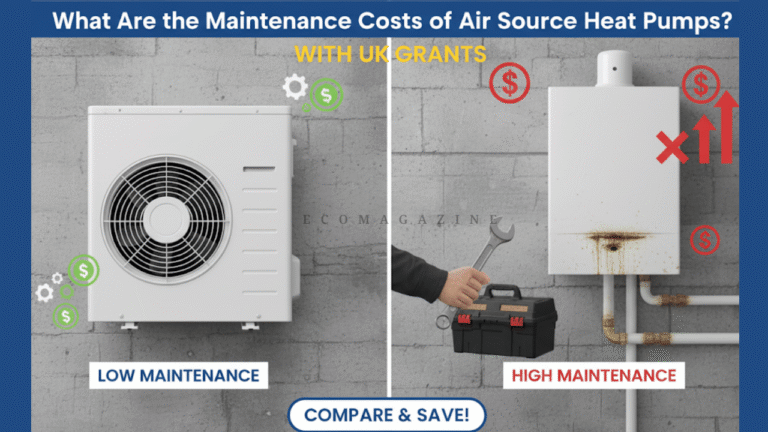Annual maintenance for an air source heat pump typically ranges from £150 to £300, with an average of £200. Smart budgeting for regular servicing protects your investment and keeps your home comfortable year-round.
Why Should You Care About Heat Pump Maintenance?
Think of your air source heat pump like a car. Would you drive for years without an MOT or service? Of course not! Your heat pump works just as hard, running day and night to keep your home warm.
Regular maintenance isn’t just a nice-to-have – it’s essential. Here’s why smart homeowners never skip their annual service:
- Peak efficiency means lower bills. A well-maintained system uses less energy
- Prevents nasty surprises. Catch problems before they become expensive disasters
- Protects your warranty. Most manufacturers require annual servicing
- Keeps government grants valid. The Boiler Upgrade Scheme demands proper maintenance
What Does Annual Servicing Actually Cost?
Let’s talk numbers. What can you expect to pay for professional maintenance in the UK?
The Real Price Range
Most homeowners pay between £150 and £300 annually, with £200 being the sweet spot. But what exactly are you paying for?
A comprehensive annual service typically includes:
- Electrical safety checks to prevent dangerous faults
- Refrigerant pressure testing to ensure optimal performance
- Deep cleaning of filters, coils, and outdoor units
- Component testing for compressors, fans, and pumps
- Minor parts replacement like seals and gaskets
Think of it as a full health check for your heating system. Would you rather pay £200 now or face a £2,000 repair bill later?
When Things Go Wrong: Repair Costs Explained
Even the best-maintained systems sometimes need repairs. What should you budget for when problems arise?
Common Repair Scenarios
- Minor issues like electrical faults or control problems typically start around £150. These are usually quick fixes that won’t break the bank.
- Major component failures tell a different story. Need a new compressor? You could be looking at up to £2,000. That’s why prevention beats cure every time.
- Average repair costs hover around £500, plus you’ll pay a £100 minimum call-out fee and roughly £40 per hour for labour.
Location Matters
Live in London or the South East? Expect to pay premium rates. Rural areas often offer better value, but finding qualified technicians might take longer.
Smart Ways to Spread the Costs
Worried about sudden maintenance bills? Service plans offer peace of mind and budget predictability.
Many providers offer monthly plans for £10 to £20 per month. These typically cover:
- Annual servicing
- Basic parts replacement
- Priority booking
- Emergency call-outs
Is it worth it? For most homeowners, yes. You’ll avoid bill shock and ensure your system gets proper attention.
Can You Handle Some Maintenance Yourself?
Absolutely! While you’ll need professionals for technical work, there’s plenty you can do to keep costs down.
DIY Tasks That Make a Difference
Filter replacement costs just £5 to £50 for a pack and takes minutes to complete. Clean filters allow smoother airflow, which reduces your energy bills.
Keeping the outdoor unit clear costs nothing but saves money. Remove leaves, debris, and anything blocking airflow. Your heat pump grant will thank you.
Visual inspections help spot problems early. Look for ice buildup, unusual noises, or refrigerant leaks. Catching issues early prevents expensive failures.
What Affects Your Maintenance Costs?
Several factors influence how much you’ll spend on upkeep. Understanding these helps you plan better.
System Factors
Size and complexity matter enormously. A simple single-zone system costs less to maintain than a complex multi-zone setup serving a large home.
Age makes a difference too. Newer systems run smoothly with basic maintenance. Older units often need more attention and replacement parts.
External Factors
Your location affects labour costs significantly. Urban areas typically charge more than rural locations.
Timing matters as well. Book maintenance during quiet seasons and you might secure better rates. Wait until peak winter demand and expect premium pricing.
The Long-Term Financial Picture
Here’s the thing about maintenance – it’s an investment, not just an expense. Let’s look at the numbers that really matter.
Return on Investment
Regular servicing preserves your heat pump’s efficiency rating. A well-maintained system maintains its Coefficient of Performance (COP), keeping your running costs low.
- Lifespan extension provides huge value. Properly maintained systems last 15 to 20 years or more. Neglected units often fail after just 10 to 15 years. That’s thousands in avoided replacement costs.
- Emergency avoidance saves money and stress. Would you rather pay £200 for annual maintenance or face a complete system failure in January?
Energy Savings Add Up
An efficiently running heat pump uses significantly less electricity. Over a system’s lifetime, maintenance savings often exceed maintenance costs through reduced energy bills.
Your Maintenance Action Plan
Ready to protect your investment? Here’s your roadmap to smart heat pump maintenance.
- Budget wisely. Set aside £150 to £300 annually for professional servicing. Consider a monthly service plan if you prefer predictable costs.
- Schedule strategically. Book maintenance during spring or autumn when demand is lower and prices better.
- Stay involved. Handle simple tasks like filter changes and keeping outdoor units clear. Your wallet will thank you.
- Choose quality providers. Cheap maintenance often costs more long-term. Find qualified, experienced technicians who understand your system.
The Bottom Line
Maintaining your air source heat pump isn’t optional; it’s essential for protecting your investment and keeping your home comfortable. With annual costs typically ranging from £150 to £300, proper maintenance delivers excellent value through improved efficiency, extended lifespan, and avoided emergencies.
Through initiatives like the ECO4 Scheme, households can further maximise savings and ensure their systems are running at peak performance.
Remember, every pound spent on maintenance saves pounds on energy bills and prevents costly breakdowns. Your future self will thank you for making this smart investment today.


